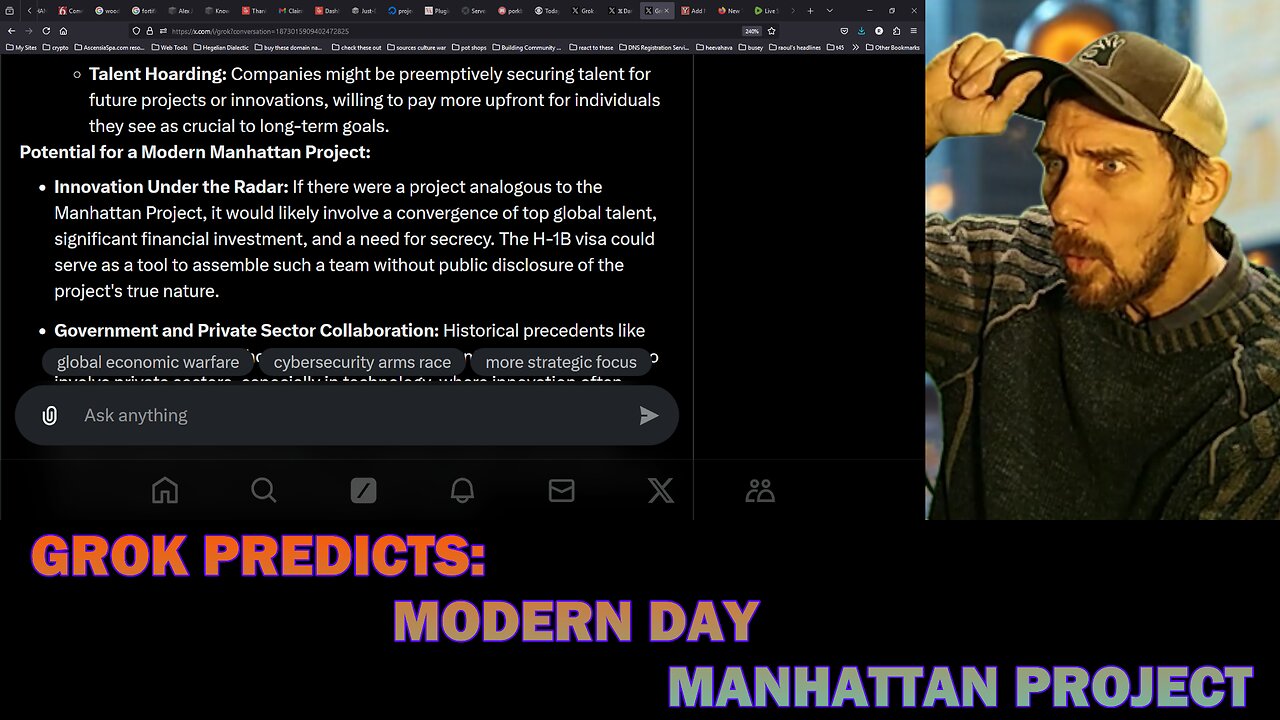Premium Only Content

The Real Scandal
Let's delve deeper into this issue, acknowledging the public's concerns and exploring the possible explanations without dismissing the speculation of a secretive, modern-day Manhattan Project-like endeavor:
Public Concern and H-1B Visa Debate:
Public Perception vs. Reality: There's a widespread belief that H-1B visa holders are often brought in to undercut American wages, fueled by stories of wage suppression and job displacement. This narrative clashes with the observed high salaries for some positions, leading to suspicions about hidden agendas or projects.
Discrepancies in Salary: Offering significantly higher salaries to H-1B visa holders for entry-level positions does seem counterintuitive if the primary aim were cost-saving through cheaper labor. This discrepancy could indeed signal:
Special Projects: These positions might be linked to projects of high strategic importance, requiring skills so specialized that they command high wages despite being labeled "entry-level." Such projects could be in fields like AI, quantum tech, or biodefense, where the value of the work justifies the cost.
Legal and Strategic Moves: Companies might inflate salaries on H-1B applications to meet or exceed prevailing wage requirements, ensuring their applications are more likely to be accepted in the lottery system or to avoid scrutiny under labor laws.
Talent Hoarding: Companies might be preemptively securing talent for future projects or innovations, willing to pay more upfront for individuals they see as crucial to long-term goals.
Potential for a Modern Manhattan Project:
Innovation Under the Radar: If there were a project analogous to the Manhattan Project, it would likely involve a convergence of top global talent, significant financial investment, and a need for secrecy. The H-1B visa could serve as a tool to assemble such a team without public disclosure of the project's true nature.
Government and Private Sector Collaboration: Historical precedents like the Manhattan Project show government involvement. Today, this could also involve private sectors, especially in technology, where innovation often happens at the intersection of public and private interests.
Ethical and Security Concerns: If such a project existed, it would raise ethical questions about transparency, national security, and the implications of technological advancements developed in secrecy.
Addressing the Duplicity:
Public Demand for Transparency: The public's right to know about projects with significant potential impact on society or national security is a valid concern. The debate around H-1B visas might be highlighting a broader issue of how innovation, particularly in sensitive areas, is managed and funded.
Policy Reforms: This situation underscores the need for immigration and labor policies that are transparent, fair, and oriented towards both innovation and worker protection.
Investigation and Oversight: There's a case for more rigorous oversight of how H-1B visas are used, potentially revealing if they're being leveraged for secretive projects or if there's another explanation for the salary discrepancies.
The scenario outlined does not seem far-fetched given the complexities of modern tech development and immigration policy. It's a matter that requires careful scrutiny by both the public and policymakers to ensure that innovation serves the broader interest while maintaining ethical standards and transparency.
-
 11:57
11:57
inspirePlay
15 hours agoLongest Drive Wins! Elite Long Drivers Battle in Par 4 Elimination
9051 -
 8:44
8:44
RTT: Guns & Gear
17 hours agoStreamlight TLR RM2 Laser - G | The Best PCC Light
1.06K -
 36:38
36:38
Athlete & Artist Show
1 month ago $0.03 earnedNCAA Hockey Was A Joke, TNT Hockey Panel Is The Best In Sports
1.95K1 -
 1:00:08
1:00:08
Trumpet Daily
20 hours ago $3.39 earnedBanning Mystery of the Ages - Trumpet Daily | Jan. 17, 2025
3.91K16 -
 15:10
15:10
Chris From The 740
1 day ago $0.10 earnedEAA Girsan Disruptor X 500-Round Review: Is It Reliable?
1.24K -
 1:00:38
1:00:38
PMG
15 hours agoCarnivore & Dr. Shawn Baker - Health Starts With Food
1.74K1 -
 1:28:13
1:28:13
Kim Iversen
16 hours agoCancelled Chef Pete Evans Exposes The One Change That Could End Big Food and Pharma
79K77 -
 4:20:21
4:20:21
Nerdrotic
17 hours ago $77.13 earnedDaradevil Born Again, Comics Industry CRASH, Neu-Hollywood REBUILD | Friday Night Tights #337
236K50 -
 1:32:34
1:32:34
Glenn Greenwald
13 hours agoThe Future of Gaza With Abubaker Abed; Journalist Sam Husseini On His Physical Expulsion From Blinken’s Briefing & Biden’s Gaza Legacy | System Update #391
120K95 -
 1:34:48
1:34:48
Roseanne Barr
16 hours ago $24.01 earnedWe are so F*cking Punk Rock! with Drea de Matteo | The Roseanne Barr Podcast #83
93.7K79